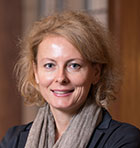Friendship, Love, and Desire
What is friendship? Which qualities make a good friend? Why do some philosophical traditions consider friendship crucial to a community and sometimes even more important than justice? This course will examine the different expressions of love across a wide spectrum of human experience: philia (friendship between two people), agapê (love for one's neighbor, and for the rest of humanity), and eros (desire).
-
Coursework Overview
The coursework for this Endeavor community involves taking a one-unit course in the fall semester and a half-unit course in the spring semester, both taught by Dr. Radi.
Fall 2024 Semester
Spring 2025 Semester
FYS 100: Friendship, Love, and Desire (1 unit)
IDST 190: Friendship, Love, and Desire Seminar (.5 unit)
FYS 100 satisfies a general education requirement; students are required to take one first-year seminar (FYS) during each of their first semester at Richmond.
IDST 190 is a half-unit project based course part of the Endeavor program.
-
Specific Course Information
FYS 100: Friendship, Love, and Desire
We will explore various perspectives on friendship, love and desire through the lenses of philosophy, literature, cinema, and the arts. Excerpts from the philosophical works of different cultural traditions will lay the foundations for an inquiry into these notions as investigated in literature and the visual and performing arts. Some of the questions we will ask in this class are:
- How has friendship been imagined or conceived?
- What qualities yield a strong friendship between individuals and between groups?
- What is the relationship between friendship and moral obligation?
- Can people with differing perspectives be friends with each other? What about nations?
- What are the foundational principles of a love relationship, and how have they been seen to differ from friendships?
- In which ways do different social and/or cultural factors affect friendships and love relationships?
- How have diverse or shifting ideas about gender and sexuality affected our ideas about friendship, love, and desire?
- Finally, how has erotic desire been seen as intensifying or complicating bonds of friendship or love?
IDST 190: Friendship, Love, and Desire Seminar
In the Spring semester, we will organize a campus-wide cultural event (inviting a speaker, bringing a play on campus, setting up a virtual art exhibit, conducting interviews around campus, or making a short movie, etc.) that will engage in meaningful ways one or more of the themes analyzed in our class. In the context of defining and designing this cultural event, students will learn the highly valuable skills of grant writing, marketing, community partnership building, public speaking and much more. This activity is meant to engage the larger community into a public conversation around the themes of our course. In this class, students will become active learners, makers and facilitators of culture, art, knowledge and intercultural dialogue.
-
Faculty Information
Dr. Lidia Radi is an Associate Professor of French and Italian
-
Endeavor Short Course Information
As part of the Endeavor program, you will particiapte in the popular Endeavor Pre-Orientation program, where you will take a short course led by Dr. Radi.
Short Course Description: Friendship, Intercultural Dialogue and the Liberal Arts
Social media networks, sophisticated apps, technologically advanced devices have connected people and places around the globe in unprecedented ways. We can visit countries, learn about new cultures and their cuisines, shop or invest globally, or communicate in real time with people from all corners of the world, without ever needing to step outside or leave the comforts of our own homes. If on the one hand this global connectedness reflects the genius and creativity of the human mind, along with our ever growing desire to explore new places and connect with other human beings, on the other we are also living through a moment in time in which communities are becoming increasingly polarized, afraid of the Other, suspicious of any novelties or ideas that go beyond their known territory. This short course will be divided in two parts: the theoretical part will delve into an analysis of how intercultural dialogue can alleviate the latter fears and suspicions, while the practical side will apply interculturalism to real life events and cases. How can we see life from a different perspective? How can we build healthy relationships within our community? How can we, as individuals, promote meaningful dialogue with people who experience life in different contexts from our own (different linguistic, cultural, or political realities)? What is the responsibility of individuals and citizens in this context? Since you are about to embark in a Liberal Arts education, we will frame the conversation around the role that this kind of education plays in forming individuals and in building a community of caring and responsible citizens.
